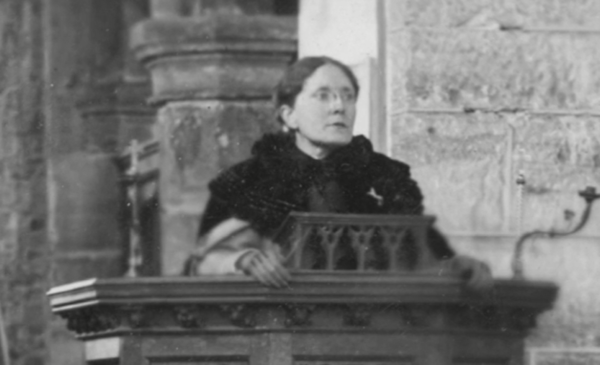Meet Frances Willard, in her day “the most widely-known and loved Methodist woman since Susanna Wesley.”
She may not be a household name now, but Methodist reformer Frances Willard was once the president of the largest woman’s organization in the United States. She was a force in the late 19th century seeking voting rights, better conditions for women, and even full representation in the Methodist Church. One pastor in Ohio was quoted as saying, “God, Buffalo Bill, and Frances Willard were the three most wonderful people on earth.”
United Methodist historians say Willard has not always received full credit for her substantial contributions to her country or her church. The Rev. Alfred T. Day III, General Commission on Archives and History: “Frances Willard is a person who brought the involvement of women in and through the Methodist Church very much into the foreground.”
Church historians have called this red-headed reformer “the most widely-known and loved Methodist woman since Susanna Wesley.”
In the late 1800’s, Frances Willard was a professor and Dean of Women at a time few females went to college. But she may be best remembered for her 19 years as president of the Woman’s Christian Temperance Union in the U.S., which sought to ban the sale of alcohol.
Willard saw men as victims of the temptation of liquor but believed the ultimate victims were women and children.
The Rev. Alfred T. Day III, General Commission on Archives and History: “They weren’t concerned about abstinence from alcohol for abstinence sake. They saw that the church had a message to proclaim to people that mothers and women needed to speak up about because of how social conditions in that time were really ruining people’s lives. We remember Frances Willard only as a great temperance worker, only for a saying things like, ‘Lips that touch liquor will never touch mine.’ And I think that that really minimizes the extent of what Frances Willard and other women like her in that period of time were concerned about.”
The Temperance Union became the largest women’s organization in the U.S. 150,000 members strong, the association moved beyond prohibition to argue for an eight-hour workday, raise the age of consent for girls, and secure the right of women to vote. In the Methodist Church, Willard also pushed the envelope.G
Dale Patterson, General Commission on Archives and History: “She was actually originally elected to General Conference before women could be elected. And they made plans to see if General Conference would seat them.”
Willard didn’t get to challenge General Conference that year. She was called home to care for her mother. Never married, she traveled extensively in her work.
Dale Patterson, General Commission on Archives and History: “She had a small desk. We think of a laptop computer nowadays. She had like the original laptop. When the train would get to a train station, if she needed to send off a telegram, she would jump off the train, quickly give the paper to the telegraph operator and then get back on and continue on to her next destination.”
Willard wrote several books, including one on learning to ride a bike after age 50.
Dale Patterson, General Commission on Archives and History: “She says, ‘Learning to ride a bicycle is a whole lot like learning to live life. You’ve gotta keep it pointed in the right direction and every now and then you’ve gotta give it a little kick with your feet as you’re pedaling. Otherwise the wheel will wobble and you’ll fall off in the ditch.’”
Willard remained president of the Temperance Union until her death in 1898.
Although she did not live to see it, her influence helped secure the passage of the 18th and 19th Amendments, prohibition and women’s suffrage. This faithful Methodist was the first woman honored with a place in the National Statuary Hall of the U.S. Capitol, setting her legacy in stone for future generations.
The Rev. Alfred T. Day III, General Commission on Archives and History: “Frances Willard embodies that Wesleyan sense of practical divinity. That you just don’t go to church to hear a religious message but the religious message you hear, changes not only your life, but changes the life of the world around you.”
Last Updated on August 9, 2016

